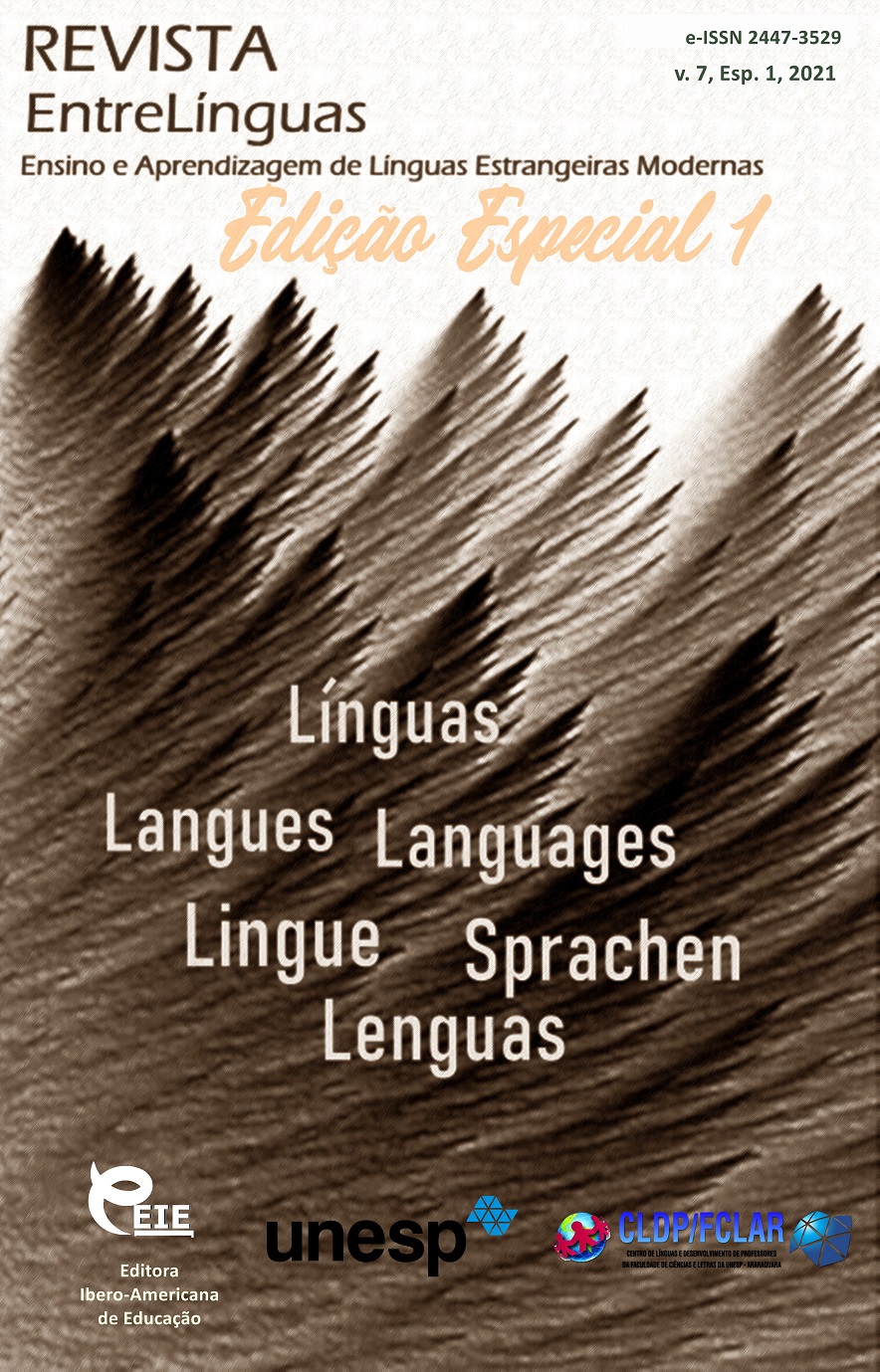Idioms as phrasal units in teaching a foreign language in the educational university space
DOI:
https://doi.org/10.29051/el.v7iEsp1.14873Keywords:
Learning, English language, Foreign language, Phraseological units, Linguodidactic competenceAbstract
Nowadays there is a constantly growing attention to the cultural problems of education in the pedagogical field. The subject of a “foreign language” does not only acquaint us with the culture of the country and the language that is being studied, but elevates the peculiarities of its national culture by comparison, introduces universal values, i.e. promotes the education of students in the context of the “dialogue of cultures” (ABDRAFIKOVA; AKHMADULLINA; YARMAKEEV, 2015). The involvement of cultural and linguodidactic components, namely the idioms in the English language, is absolutely necessary when we achieve the main practical goal in the process of teaching of a foreign language – a formation of the ability to communicate in the target language. In this way, learning to communicate using a foreign language in a real sense implies acquisition of socio-cultural knowledge and skills (SHARAFIEVA et al., 2019). The linguodidactic approach includes the study and use of idioms as phrasal units in foreign language, which should perform five functions: developmental, educational, upbringing, cognitive and professional. Teaching a foreign language as a part of a linguodidactic approach can be defined as a joint activity of a teacher and students, when the former transfers knowledge, skills and abilities to trainees (teaching), and the latter get this knowledge, skills and abilities (learning); as a social process, due to the needs of the development of society, the process of assigning of social and socioeconomic experience.
Downloads
References
ABDRAFIKOVA, A. R.; AKHMADULLINA, R. M.; YARMAKEEV, I. E. Formation of the communicative competence in students future pedagogues for working with gifted pupils. Social Sciences (Pakistan),v. 10, n. 7, p. 1817-1821, 2015.
ABDRAFIKOVA, A. R.; AKHMADULLINA, R. M.; YARMAKEEV, I. E.; PIMENOVA, T. S.; VALIAKHMETOVA, N. Five Easy Steps to Successfully Teach Your Course in English. In: INTERNATIONAL TECHNOLOGY, EDUCATION AND DEVELOPMENT CONFERENCE, 14., 2020, Valencia. Proceedings […]. Valencia, Spain: INTED, 2020. v. 1, p. 3680-3688.
DENISENKOVA, N. S. Exploring first graders’ learning motivation in different educational environments. Psychological Science and Education, v. 25, n. 1, p. 5-15, 2020.
FAHRUTDINOV, R.; FAHRUTDINOVA, R.; ABSATOVA, M. An independent work of students in the process of professional training of future teachers of foreign language in the educational space of the higher educational institution. National Academy of Managerial Staff of Culture and Arts Herald, v. 3, 2018.
MEREKKEEVNA, E. B.; FAHRUTDINOVA, R. A.; FAHRUTDINOV, R. R.; SHAKIROVA, A. Formación de estudiantes en tecnología del crédito en educación de Kazajstán. Orbis: revista de Ciencias Humanas, v. 14, n. 41, p. 87-94, 2018.
SERGEEV, I. S. Fundamentals of pedagogical activity: textbook. New knowledge, n. 4, p. 56-58, 2004.
SHARAFIEVA, A. M. et al. Modeling Dialogues in FL Class. International Journal of Higher Education, v. 8, n. 7, p. 62-68, 2019.
STATE EDUCATIONAL STANDARD OF HIGHER EDUCATION [Electronic resource]. Available in: http://www.edu.ru. Access in: 10 dec. 2020.
VALIAKHMETOVA, N.; AKHMADULLINA, R.; PIMENOVA, T. Ethno-pedagogy as a means of ethnic identity formation of pre-service teachers in Russia. Social Sciences and Humanities, v. 1, p. 387-392, 2017.
VERBITSKY, A. A. Research center of problems quality of training. Competence approach and theory of context training: Materials for the fourth meeting of the methodological seminar. 2004.
Downloads
Published
How to Cite
Issue
Section
License

This work is licensed under a Creative Commons Attribution-NonCommercial-ShareAlike 4.0 International License.
Os manuscritos aceitos e publicados são de propriedade da Revista EntreLínguas. Os artigos publicados e as referências citadas na Revista EntreLínguas são de inteira responsabilidade de seus autores.
Transferência de direitos autorais – autorização para publicação
Caso o artigo submetido seja aprovado para publicação, já fica acordado que o(s) autor(es) autoriza(m) a UNESP a reproduzi-lo e publicá-lo na EntreLínguas, entendendo-se os termos “reprodução” e “publicação” conforme definição respectivamente dos incisos VI e I do artigo 5° da Lei 9610/98. O artigo poderá ser acessado pela rede mundial de computadores (Internet), sendo permitidas, a título gratuito, a consulta e a reprodução de exemplar do artigo para uso próprio de quem a consulta, desde que haja a citação ao texto consultado. Essa autorização de publicação 328 EntreLínguas, Araraquara, v. 1, n .2, p. 323-328, jul./dez. 2015 não tem limitação de tempo, ficando a UNESP responsável pela manutenção da identificação do(s) autor(es) do artigo. Os artigos publicados e as referências citadas na Revista EntreLínguas são de inteira responsabilidade de seus autores.











